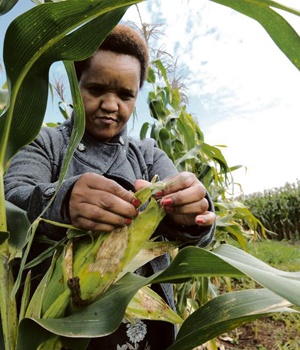
It is a quiet time for the farmers of Thuthura. The hard work has been done and their maize stands in the field in serried rows. Now, the villagers have to wait for harvest time in July – and protect their precious crops from roaming livestock and thieves.
“Everyone is happy in our villages. We are united because our stomachs are full and we are confident that we are going to make this project sustainable and provide a lot of our people with opportunities,” says Chief Zonwabele Dyantyi.
By the end of last year, the brand-new commercial farmers of the Centane area, 10km outside the impoverished Eastern Cape town of Butterworth, were already reaping the rewards of their labours. Dividends of up to R3 000 were distributed and each household received 10 bags of maize, while 120 community members had received training in the business of profitable farming.
December 2014, says Dyantyi, was a turning point. “In the past we used to have a dark Christmas, but that is now a thing of the past. Our lives have truly changed for the better.”
Thanks to a bold pilot project to bring 600 hectares of idle land back to life, 683 households previously struggling with poverty and unemployment are now starting to see a brighter future.
It was not always this way. Back in 2007, the female-owned black investment company Wiphold visited the area and decided to get involved in a bid to help local people to support themselves.
The company’s founder and CEO, Gloria Serobe, arrived in Thuthura village in Centane accompanied by local project manager Pinky Matanzima.
They met with village chiefs and discussed the community’s needs and how Wiphold could help.
The outcome was overwhelmingly in favour of commercial farming – to cultivate the land that had been lying idle since a government farming initiative had fizzled out and left the community in limbo.
More meetings and consultations followed. Each household provided 2ha to the project and Wiphold invested around R25 million. TechnoServe – a US-based not-for-profit organisation that provides resources and skills training – was brought in to teach people about crop farming.
Finally, the first maize crop was planted in January 2014.
Wiphold’s Matanzima, originally from Cofimvaba, about 130km from Centane, was soon driving the project and has become part of the community.
“The people of Centane are passionate about farming and have truly embraced the project as their own. I have not experienced any problems working with them, and training is being provided to ensure that the project remains sustainable when we leave in five years,” says the 51-year-old project manager.
The land is fertile, she adds, and perfectly suited for maize production – and the rains have been good.
This year Wiphold added a further R18 million to the pot.
“Wiphold takes what they have spent to finance the project from the profits. An extra R1 million in profit was realised after expenses and distributed among the households last year,” says Matanzima.
This season, Wiphold, through a company contracted by TechnoServe that acts as overseer of the project, has ploughed 673ha of land around four Centane villages. Seven people have been employed as tractor drivers.
In addition to the 120 locals who have already been trained, another 60 people recently completed training.
Their focus is on the five stages of basic crop farming, including soil testing, reaping, planting and spraying. Another four people from the villages are currently being trained as farm managers to take over the running of the project in future.
Matanzima is delighted. “Through this project, we want to show that commercial farming can take place among rural households, where people can farm, provide food for themselves and have a product to sell and profit from.”
The project now also has a formal marketer. Farmwise Grains, a South African trading firm, will act as broker, placing the community’s produce in the high-demand maize market.
During a visit to the area this week, the sense of pride among the people of the village as they surveyed their 2m-high stems of maize was clearly visible.
The men have taken it on themselves to guard their produce. They take turns patrolling the length and breadth of the cultivated area to ensure that no livestock breaks through the fence and to watch for would-be thieves.
Dyantyi says most villagers now have jobs thanks to work on the farms during the ploughing and harvesting stages.
“We are all participating, and this projecthas helped a lot of our residents put food on the table.
“I am one of those men who doesn’t sleep at night, as I am part of the farm patrol. I see this as my responsibility as a beneficiary and a member of good standing in the community,” he says.




 Publications
Publications
 Partners
Partners








